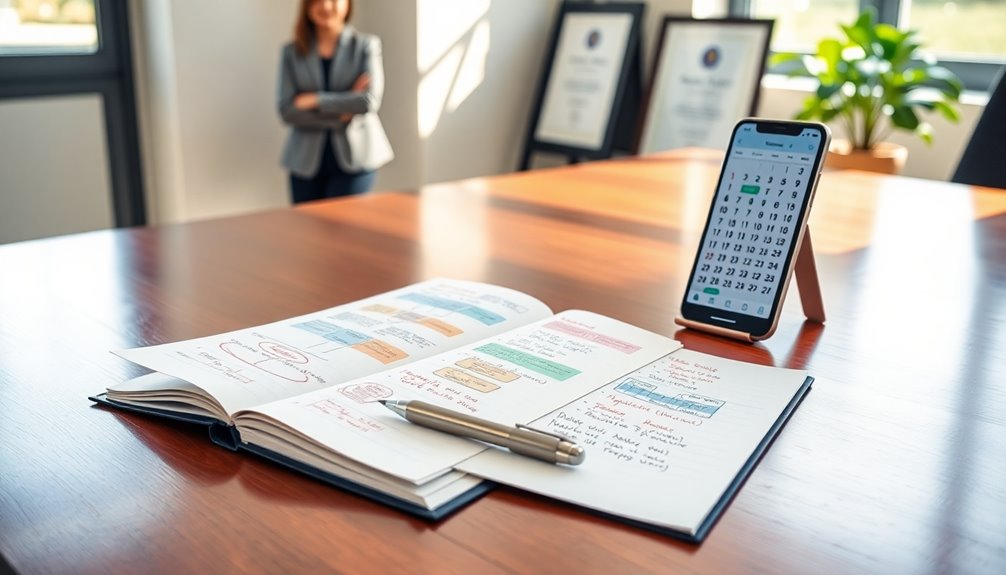To achieve interview success, you need to ask essential questions that demonstrate your interest and guarantee the role fits your career goals. Start by inquiring why the team fills this position and what challenges past employees faced. Understand the company culture by asking about its values and work-life balance policies. Additionally, explore opportunities for professional growth and employee development. By integrating these questions into your conversation, you'll foster a meaningful dialogue with your interviewers. Keep these strategies in mind to make a lasting impression, as there's more valuable guidance waiting for you just ahead.
Key Takeaways
- Ask about the reasons for filling the role to understand team needs and expectations.
- Inquire about key challenges faced by previous employees to gauge potential obstacles.
- Explore the company's core values to assess alignment with your personal values and work style.
- Discuss work-life balance policies to evaluate how they support employee well-being and productivity.
- Understand long-term career development opportunities within the company to ensure growth potential.
Importance of Asking Questions

Asking questions during an interview isn't just a formality; it actively demonstrates your genuine interest in the role and the company. This engagement provides essential insights into the company culture and expectations, helping you assess whether it aligns with your career goals.
By clarifying job responsibilities and challenges, you can better understand what's required of you, making it easier to envision your potential fit. Additionally, asking questions fosters an open dialogue with your interviewers, allowing for a more conversational atmosphere.
This interaction not only keeps the interview dynamic but also offers glimpses into potential challenges you might face. Ultimately, your inquiries reveal your enthusiasm to contribute and succeed in the role, setting a positive tone for the conversation.
Strategies for Effective Questioning

Effective question strategies can greatly enhance your interview experience and outcomes. To make the most of your time, prepare a few key questions in advance and aim to ask at least three. Integrate these questions naturally into the conversation, while being mindful of the flow and context. Timing is everything, so use your judgment to determine when to pose your questions. Demonstrating strong communication skills during the interview will not only enhance clarity but also build rapport with your interviewer.
Here's a quick reference table for effective questioning:
| Strategy | Description |
|---|---|
| Prepare Key Questions | Have a list ready to show your interest. |
| Ask Open-Ended Questions | Encourage detailed responses and insights. |
| Be Mindful of Timing | Gauge when it's appropriate to ask your questions. |
Questions About the Job Role

When you're in an interview, asking the right questions about the job role can considerably impact your understanding of what's expected.
Start by inquiring why the team is looking to fill this role, as it reveals the underlying reasons for the vacancy. You might also ask about past challenges faced by previous employees, giving you insight into potential difficulties.
Understanding what impact you can make in your first 90 days is essential, so don't hesitate to ask. Additionally, find out what skills are necessary for success in this role.
Finally, inquire about a typical day and current team projects to better visualize your future responsibilities.
These questions help you assess alignment with your career goals and demonstrate your genuine interest.
Inquiries on Company Trends

Understanding company trends is essential for evaluating your potential fit within an organization. By asking about major trends affecting the company in the next year or two, you'll gain insights into future challenges and opportunities.
You can also inquire how the company adapts to industry changes, which shows its agility and responsiveness. Questions about long-term strategic goals help you understand the organization's vision for growth, while asking about current market challenges reveals hurdles that may impact your role.
Finally, consider asking about recent changes made to improve the company's position. This information not only demonstrates your interest but also helps you gauge how your skills and experiences align with the company's direction.
Understanding Company Culture

Company culture plays an essential role in shaping your work experience and overall job satisfaction. It influences how you collaborate, communicate, and grow within the organization.
To gauge this culture during your interview, ask insightful questions. Inquire about what makes someone successful at the company, as this reveals the traits valued by your potential employer. You might also want to understand the team dynamic and how the company supports employee development.
Questions about the organization's core values can clarify if they align with your own beliefs. Finally, don't hesitate to ask about work-life balance; knowing this can greatly affect your happiness and productivity in the role. Additionally, understanding the importance of setting boundaries can help you maintain a healthy separation between your professional and personal life.
Understanding company culture is key to making an informed decision.
Management Style and Team Structure

In any workplace, management style and team structure greatly influence your day-to-day experience and overall success. Understanding how your potential manager leads can help you gauge if their approach aligns with your working style.
Ask about their management style to get a sense of their expectations and how they support their team. Inquire about the communication style within the team to determine if it fosters transparency and feedback.
Knowing who you'll work with and how the team fits within the larger organization can clarify collaboration dynamics. Don't forget to ask what support you can expect from your manager, as this can greatly impact your ability to thrive in your new role.
Employee Experience Perspectives

Your experience as an employee can significantly shape your perception of a workplace and its culture. During your interview, it's essential to explore how current employees view their roles and the company.
Ask questions like, "What do you enjoy most about working here?" or "Can you share a success story from your time at the company?" These inquiries reveal the positive aspects of the environment.
Additionally, consider asking about challenges they've faced, as this provides a realistic view of potential obstacles. Understanding how the company celebrates achievements can also indicate their commitment to employee recognition.
Onboarding and Professional Development

How smoothly does the onboarding process unfold for new hires? This is essential to your early success and comfort within the company. You should ask about the structure of the onboarding process, including the training and resources available to you.
Understanding the typical ramp-up period helps set realistic expectations. Inquire about support systems, like mentorship programs or peer assistance, that can ease your changeover.
Additionally, explore opportunities for professional development. Are there training programs available? What about support for attending industry conferences? Having access to professional development projects can significantly enhance your growth.
Knowing these aspects can greatly enhance your skill set and career trajectory. A well-defined onboarding experience coupled with robust professional development can make all the difference in your success at the company.
Performance and Career Growth

While steering your new role, understanding performance expectations and opportunities for career growth can greatly impact your long-term success.
Start by asking about initial goals for your first month and quarter; this helps clarify what's most important. Inquire how often performance reviews are conducted and what methods supervisors use to evaluate success. Understanding these processes will prepare you for feedback and growth.
Additionally, ask about the support you can expect from your manager in achieving these goals. Explore opportunities for development within the company, such as training programs or mentorship. This proactive approach not only sets you up for immediate success but also paves the way for future advancement in your career. Consider how tax implications of your benefits may also affect your financial planning as you grow in your role.
Work-Life Balance Considerations

Understanding work-life balance is essential for maintaining both productivity and personal well-being in any role. During your interview, don't hesitate to ask about the company's approach to work-life balance.
Inquire about typical work hours, overtime policies, and flexibility in remote work options. Find out how vacation and sick leave are handled, as well as any wellness initiatives they've in place.
You might also ask about the team culture regarding after-hours communication and expectations. This will help you gauge whether the company's values align with your needs.
A healthy work-life balance fosters greater job satisfaction and long-term commitment, so make sure you get a clear picture of what to expect.
Frequently Asked Questions
What Is the Company's Approach to Feedback and Communication?
When you ask about the company's approach to feedback and communication, you're showing your interest in their culture.
You'll want to know how often feedback is given and whether it's formal or informal.
Ask about the tools they use for communication and how open the environment is for sharing ideas.
Understanding this will help you gauge if the company's style aligns with your preferences for collaboration and professional growth.
Are There Mentorship Opportunities Within the Organization?
Are there mentorship opportunities within the organization?
It's great that you're considering the value of mentorship. You should definitely ask about this during your interview.
Mentorship can greatly enhance your professional growth and help you navigate the company culture.
Inquire about how the organization supports mentorship, whether formal programs exist, and how you can connect with experienced colleagues.
It'll show your commitment to personal development and building strong workplace relationships.
How Does the Company Handle Conflicts Among Team Members?
When you ask how the company handles conflicts among team members, you're showing your interest in a constructive work environment.
You'll want to listen for their conflict resolution strategies, such as mediation or open communication. It's a great way to gauge the company culture and verify it aligns with your values.
You might also gain insights into how management supports collaboration and teamwork, helping you understand what to expect in your potential role.
What Tools or Software Does the Team Primarily Use?
When you ask about the tools or software the team primarily uses, you show your interest in how you'll fit into the workflow.
It gives you insight into the resources available and helps you gauge your familiarity with them.
You might discover the team relies on specific project management or communication tools, which can also highlight the organization's efficiency and adaptability.
This knowledge can help you prepare better for the role ahead.
How Does the Organization Celebrate Team Successes?
When you ask how the organization celebrates team successes, you show your interest in the company culture.
It helps you understand if they value recognition and teamwork. Listen closely; the response can reveal how they appreciate contributions and foster motivation.
You might hear about awards, team outings, or shout-outs in meetings.
This insight can help you gauge if their approach aligns with your values and expectations for a supportive work environment.
Conclusion
As you step into your interview, let your curiosity shine like a beacon. The questions you ask can paint a vivid picture of the role and the company, illuminating the path to your future. Embrace this opportunity to connect and discover, transforming a simple conversation into a treasure trove of insights. With each thoughtful inquiry, you're not just gathering information; you're weaving your own tapestry of potential, ensuring that you find the perfect fit for your career journey.









